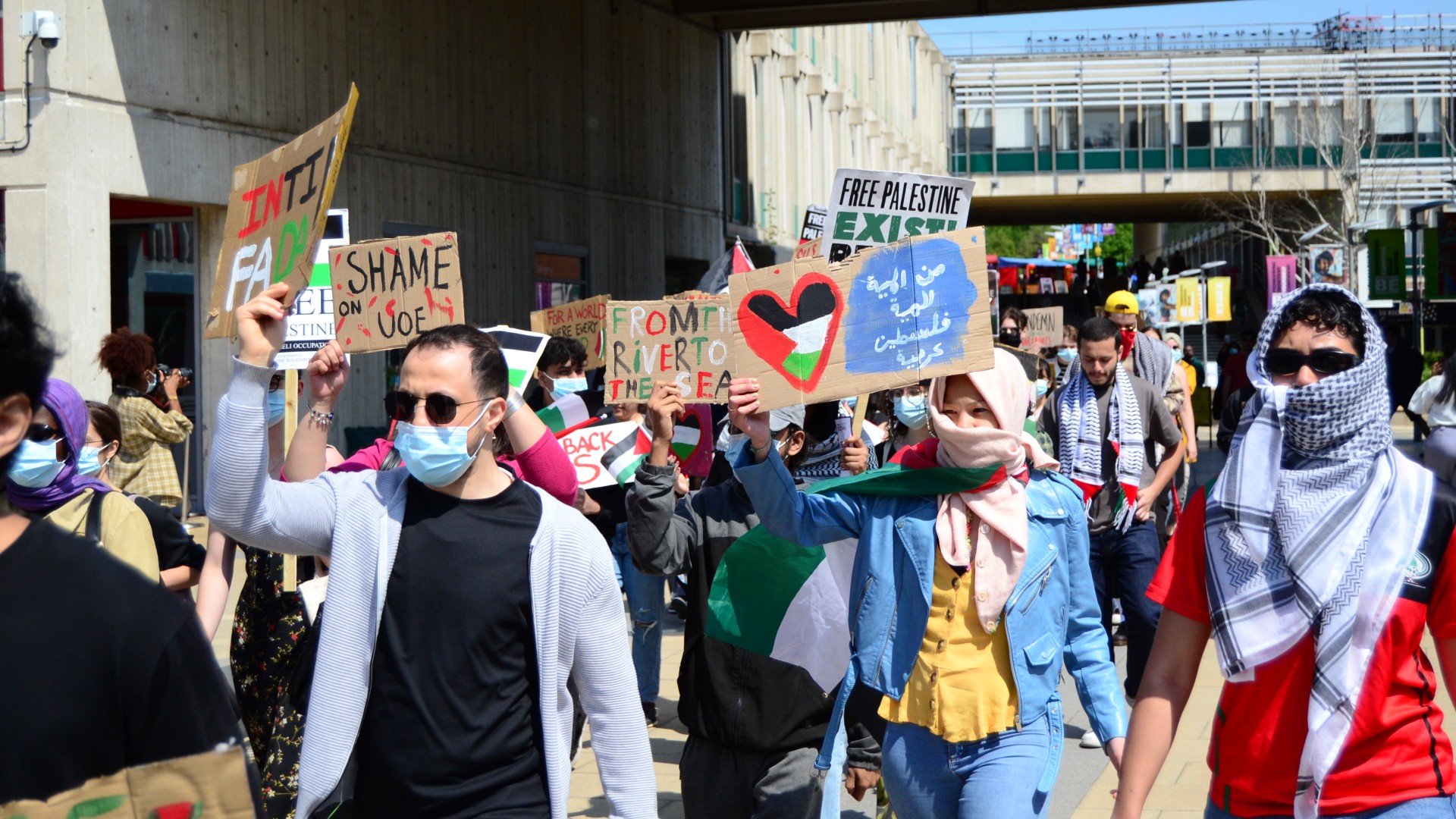UK university drops case against students over shared Middle East Eye posts

The University of Essex has dropped a case against six students threatened with expulsion for sharing posts from Middle East Eye that marked the death of Hamas leader Ismail Haniyeh.
Last year, the university began an investigation into the students after a series of complaints were lodged against them over content posted on the university's Palestine Solidarity Society Instagram page following Haniyeh's death.
Haniyeh was assassinated in Iran during a visit last July, with Israel confirming days later that it had killed the Hamas leader.
The university's investigation accused the students of breaking the student code of conduct for allegedly "supporting a proscribed group" - a claim denied by all six students - by sharing news reports related to Haniyeh's death.
A document compiled by the university as evidence against the students and seen by MEE showed that it had based its investigation on several posts shared on the pro-Palestinian society's Instagram page.
New MEE newsletter: Jerusalem Dispatch
Sign up to get the latest insights and analysis on Israel-Palestine, alongside Turkey Unpacked and other MEE newsletters
Two posts included in the university's evidence bundle are from MEE's Instagram page.
One is a video clip of an interview with Haniyeh originally broadcast by Al Jazeera Arabic in July 2024, explaining Hamas' motivations for fighting Israel. Another is a photo carousel of notable commentators, including former Al Jazeera English director-general Wadah Khanfar, marking Haniyeh’s death.
Email correspondence seen by MEE revealed that a Prevent coordinator for Essex had informed the students' union about the society's posts on Haniyeh.
David Layton-Scott, from the Department for Education’s Prevent team, contacted the University of Essex’s students' union about the posts in August 2024.
The union also told the society that the posts had been reported to the police without telling it who was responsible for the complaint.
Despite Essex Police dropping the case against the students, the university continued its investigation against the six students.
University policy states that it concludes investigations into student conduct breaches within 60 days. However, the society’s investigation lasted for more than 200 delays, prompting concerns among the students that they would be unable to graduate on time if it continued to drag on.
But the university has now dropped the charges, with a university official describing delays in the investigation as "unacceptable".
The University of Essex did not respond to Middle East Eye's request for comment on the case's conclusion or why it took longer than 60 days.
Students 'relieved' investigation is over
In a joint statement to MEE, the six students, who have been dubbed the "Essex Six", said they were relieved the case against them had been dropped.
"We believe it is inappropriate and frankly disturbing that this case was dragged on this far," the students said.
"The panel concluded that there was no evidence of bullying or harassment, no formal complainant, or breach of conduct.
"Despite dismissing the allegations, the university still framed the students' actions as 'challenging' and expressed 'serious concerns' over their social media activity - specifically criticising reposts without commentary as 'not journalism' and suggesting they could be interpreted as endorsements."
'This investigation was not just an academic threat - it risked my visa and future in the UK'
- Student activist
The panel investigating the students recommended that the students be trained in social media and free speech.
One of the students who faced possible expulsion described the ordeal as "traumatic" as the process risked them facing possible deportation from the UK.
"I could have been deported due to my university's failure in conducting its own processes in a timely manner," said the international student.
"This investigation was not just an academic threat - it risked my visa and future in the UK."
Another student described the investigation as "targeted" and said she was disappointed the university had pursued the student activists.
"As a Black-Arab Muslim woman, it is hard not to feel that I was specifically targeted and disproportionately affected by this ordeal," she said.
"While I'm relieved the case has finally been dropped, the damage caused should never have happened in the first place."
The situation facing the students at Essex University led Gina Romero, UN special rapporteur on the rights of freedom of peaceful assembly and association, to write to the university to condemn its actions.
"I have been receiving disturbing reports of alleged administrative harassment and persecution of members of the Palestine Solidarity Society at the @Uni_of_Essex for exercising their right to freedom of expression and association," Romero said on X.
"Public institutions, including public universities, must stop defaming peaceful pro-Palestinian movements by labelling them as 'supporters of terrorism' for their demands for an end to genocidal violence, apartheid and illegal occupation.
"Universities should review their regulations on hate speech and anti-Semitism and align them with international standards for the protection of freedom of expression. A critical political opinion, including expressions of political opposition to a government, or the pursuit of self-determination are protected under this right."
Campuses across the UK have witnessed intense pro-Palestine activism since the start of Israel's war on Gaza in October 2023.
Dozens held encampments, inspired by similar types of protest in the United States, to protest against their university's investments and involvement with possible Israeli war crimes.
Last February, Sky News and Liberty Investigates revealed that dozens of universities had reported protesters to the police, started dozens of disciplinaries, and, in some instances, collaborated with private surveillance companies.
The investigation found that at least 40 universities discussed Gaza protest activity with police forces or private intelligence organisations, and 36 universities had direct communication with the police.
middleeasteye.net